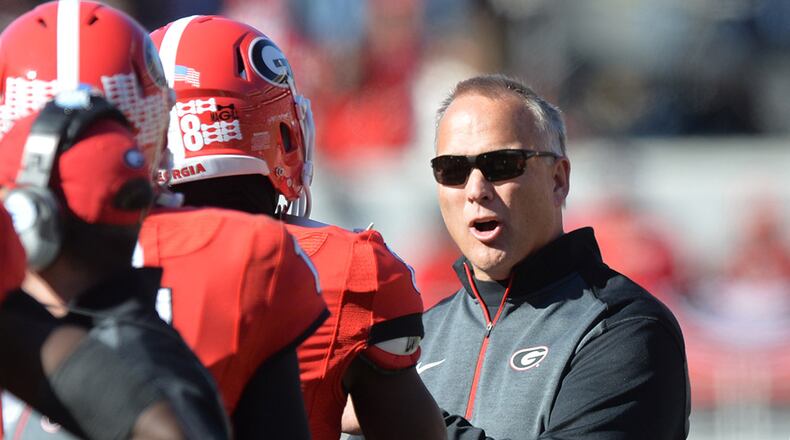MACON -- Mark Richt has moved on from pushing for change on cost-of-attendance, and is now adjusting to the new reality of it.
Richt, as well as other SEC football coaches, had been concerned that giving stipends to athletes for cost-of-attendance (which varies from school to school) would create a recruiting disadvantage. Georgia’s is a few thousand lower than Auburn and Tennessee, for instance.
But last week at SEC meetings the coaches were told in no uncertain terms that nothing could be done right away, thanks to the Ed O’Bannon ruling. It could only change on appeal, or with other ongoing legislation. So beginning on Aug. 1, the cost-of-attendance stipends are going out, and coaches can mention it on the recruiting trail.
“I think for this year the numbers are gonna be what they are,” Richt said on Tuesday. “But I think we’ll be doing some things that will help bridge the gap at Georgia, which will be perfectly legal.”
By that, Richt meant that when recruiting a player Georgia could emphasize advantages in other areas, such as how much it spends on nutrition.
“I don’t want to get into that detail, because some of it’s recruiting advantage and disadvantage,” Richt said, smiling. “I don’t want to help anybody.”
Richt does remain optimistic that eventually each school’s cost-of-attendance will “become more equitable, if not right on the nose.” Those are set by each school’s financial aid office, through parameters set by the Department of Education.
But Richt and other coaches hope that there will be more transparency in the specific formula and numbers that each school uses.
“I’ve got a feeling that when everybody knows how everybody calculates, I have a feeling that number will get closer,” Richt said.
Meanwhile, Richt also expressed support for the SEC’s new rule banning transfers who have been in trouble for “serious misconduct,” including sexual violence. It was sponsored by Georgia, which last year dismissed defensive lineman John Taylor after a domestic violence arrest. Taylor ended up at Alabama, where he was dismissed after another domestic violence arrest.
The coaches didn’t vote on the proposed rule last week, according to Richt, because it was still being “tweaked” by the athletic directors. The presidents adopted the rule last Friday, adding a waiver process in case the player has been absolved of any past charges.
“There’s some wisdom in (the new SEC rule),” Richt said. “You’ve gotta also have some discretion to make sure we’re not keeping guys from having a chance who deserve a chance. But I think it’s set up to work that out.”
About the Author
Keep Reading
The Latest
Featured


